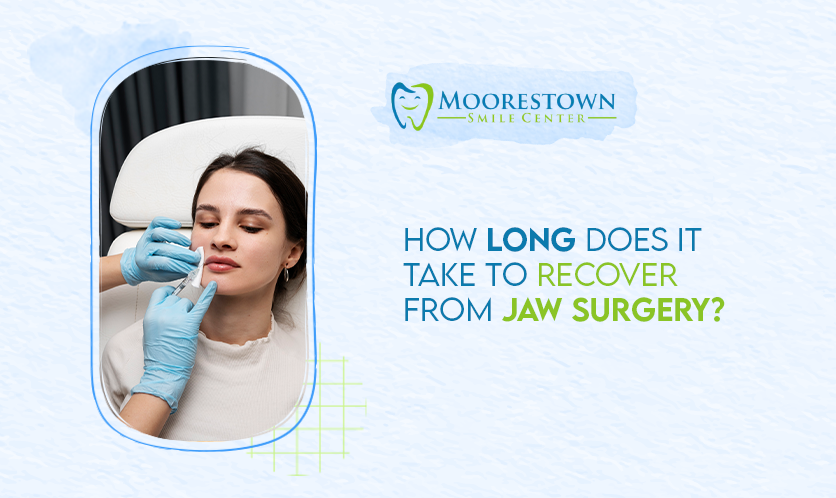Jaw surgery, known as orthognathic surgery, corrects jaw alignment issues. It marks a new beginning.
This procedure blends function with beauty. It corrects jaw misalignment, improving eating, speaking, and breathing.
Countless people ask, “How long does it take to recover from jaw surgery?”
We want to explain the healing journey. Below, we’ll outline recovery and provide tips for a speedy recovery.
At Moorestown Smile Center, we support your jaw surgery journey. We’ll help you, from surgery to recovery, for a healthy, confident smile. Contact us today.
What is Jaw Surgery, and Why Do People Need It?
Jaw surgery changes your life. It realigns your jawbones. Many undergo it to resolve medical issues, like chewing difficulties or breathing troubles.
For others, it’s about improving their smile and profile.
Jaw surgery is a transformative procedure. It can change your smile and jawline, fixing issues such as:
- An overbite or underbite.
- Forward or backward jaw alignment issue.
- Problems caused by injury or birth defects.
- Sleep apnea triggered by jaw positioning problems.
How Long Does It Take to Recover From Jaw Surgery?
What is the Recovery Time for Orthognathic Surgery?
Recovery time differs. Get your doctor’s guidance for a smooth recuperation.
Most individuals notice improvement within a few weeks, yet full recovery may stretch on for several months.
Here’s a helpful timeline to navigate the healing process ahead:
- First Week: Swelling and pain are at their peak. Rest and take only liquids.
- Weeks 2-4: Swelling starts to decrease, and you add soft foods like mashed potatoes or yogurt to your meals.
- 6 Weeks: Most people feel stronger and can go back to light activities like work or school.
- 3 to 6 Months: It requires 6 months to completely recover.
How Long After Jaw Surgery Can You Eat Normally?
When do you eat after jaw surgery? You cannot eat regular food right after. Your jaw needs time to mend before you eat a big meal.
- First 1-2 Weeks: Only drink liquids like soups, smoothies, or broths.
- Weeks 2-6: Begin with adding soft foods like scrambled eggs, pudding, or mashed bananas.
- 6+ Weeks: You may slowly start eating firmer foods. Consult your surgeon before proceeding.
Patience is key! Eating the wrong foods too soon can hurt your recovery.
How to Speed Up the Jaw Surgery Healing Timeline
Though we can’t fully control healing speed, we can achieve a smooth recovery.
-
Rest as Much as Possible
Your body heals best with rest. After surgery, relax for a few weeks. Don’t push yourself. Patience aids healing.
-
Follow Your Doctor’s Instructions
Your doctor will offer specific advice on your diet and mouth care. They’ll explain when to start moving around more, too. Following these guidelines can help speed up your orthognathic surgery healing time.
-
Stay Hydrated
Water is your secret weapon for a swift recovery. Keep a water bottle close at hand to nudge yourself to drink up. Each refreshing sip fuels your body’s healing journey.
-
Eat the Right Foods
Although you eat only certain foods, pick meals rich in vitamins and nutrients. Smoothies with fruits vegetables and protein powder make excellent options.
-
Avoid Bad Habits
Smoking and drinking delay healing. Consider quitting smoking. Your body deserves every opportunity for a remarkable recovery.
Caring for Your Jaw After Surgery
Here are some helpful tips to smooth your jaw correction surgery recovery time:
- Apply ice packs for a few days.
- Keep your mouth clean by rinsing softly with salt water or your doctor’s recommended rinse.
- Steer clear of bending or heavy lifting; it could increase the swelling.
- When you sleep, elevate your head slightly. This helps with breathing and reduces swelling.
How Much Time Does It Require to Return to Normal?
What does “normal” even mean after jaw realignment surgery? Return to work or school typically takes six weeks. As three months roll around, you’re likely feeling nearly back to your usual self. Yet, don’t rush the journey; full recovery may span up to six months. Surgery complexity is the key factor.
What are the Signs of Good Healing?
As you recover, here are some positive signs to look out for:
- Swelling starts to go down within the first two weeks.
- You feel less pain and need less medication.
- You can move your jaw more comfortably each week.
When to Call Your Doctor
While most people recover without problems, you should contact your doctor if you experience:
- Severe pain that doesn’t go away.
- Swelling that gets progressively worse.
- Difficulty breathing.
- Infection signs include fever or red skin near the surgical spot.
Final Thoughts: How Long Does It Take to Recover From Jaw Surgery?
It requires some time. Many patients begin to feel good after around six weeks.
But full recovery, with all bones and tissues healed, can take three to six months.
Healing takes time, and each day brings you closer to that perfect smile.
Follow your doctor’s advice and nurture yourself. This helps you recover better. Remember, the benefits are worth the challenges.
Picture a healthier, more functional jaw—it leads to a better life.
FAQs
Is jaw surgery painful?
During the first week, you might feel some discomfort and swelling. But rest and medication can ease the pain.
Can I exercise after surgery?
Light exercises, like walking, can help with blood flow. But avoid heavy activities until your doctor says it’s okay.
When will swelling go away?
Most swelling goes down after the first two weeks, but some puffiness may last for months.





